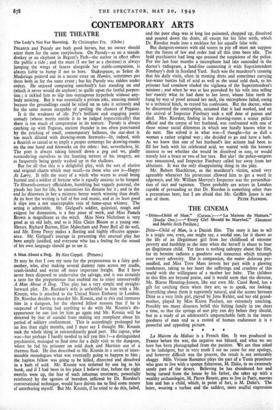A Man About a Dog. By Alec Coppel. (Princes.) IT
may be that I owe my taste for the preposterous to a fairy god- mother, who, after making several dummy runs across my cradle, crash-landed and wrote off more important freight. But I have never been disposed to undervalue the salvage, and it was certainly a taste for the preposterous that enabled me to enjoy unreservedly A Man About A Dog. This play has a very simple and straight- forward plot. Dr. Riordan's wife is unfaithful to him with a Mr. Kronin, who is attached to the United States Embassy in London. Dr. Riordan decides to murder Mr. Kronin, and to this end immures him in a dungeon, for the shrewd fellow reasons that if he is suspected of having had anything to do with Mr. Kronin's dis- appearance he can just let him go again and Mr. Kronin will be deterred by fear of scandal from making any complaint about his period of solitary confinement. This is accordingly prolonged for no less than eight months, and I must say I thought Mr. Kronin took the whole thing in extraordinarily good part. His captor, who was—but perhaps I hardly needed to tell you this ?—a distinguished psychiatrist, managed to find time for a daily visit to the dungeon, where he fed his prisoner on cold duck and Martinis out of a thermos flask. He also described to Mr. Kronin in a series of inter- minable monologues what was eventually going to happen to him ; the hapless fellow was going to be killed, dissected and dissolved in a bath of acid. Mr. Kronin was tethered by one leg to his bunk, and if I had been in his place I believe that, before the eight months were up, the fear of such inhuman treatment, powerfully reinforced by the agonies of boredom inflicted by Dr. Riordan's conversational technique, would have driven me to find some means of untethering myself. But Mr. Kronin, if he tried to do this, failed,
and the poor chap was at long last poisoned, chopped up, dissolved and poured down the drain, all except for his false teeth, which Dr. Riordan made into a necklace for his equally false wife.
But dungeon-owners with old scores to pay off must not suppose that the forces of law and order had all this time been idle. The bold psychiatrist had long ago aroused the suspicions of the police. For the last four months a microphone had lain concealed in the doctor's radiogram, a land-line connecting it with Superintendent Finsbury's desk in Scotland Yard. Such was the murderer's cunning that his daily visits, often in evening dress and sometimes carrying hot-water bottles full of acid as well as the usual cold duck, to his prisoner had somehow eluded the vigilance of the Superintendent's minions ; and when he was at last provoked by his wife into telling her exactly what he had done to her lover, whose false teeth he hung by way of proof around her neck, the microphone failed, owing to a technical hitch, to record his confession. But the doctor, when he discovered the contraption, assumed that it had worked, and on the arrival of Inspector Finsbury took a stiff dose of poison and died. Mrs. Riordan, finding in her drawing-room a senior police official and the corpse of her husband, was confronted with one of those minor social dilemmas in which one hardly knows what to do next. She solved it in what was—I thought—for so dull a woman a rather original way ; she decided to go and have a bath. As we knew that one of her husband's last actions had been to fill her bath with his celebrated acid, we waited with the keenest interest to see whether she would be dissolved in toto, or would merely lose a brace or two of her toes. But alas! the police-surgeon was announced, and Inspector Finsbury called her away from her ablutions. It was the only disappointing thing in the play.
Mr. Robert Shackleton, as the murderer's victim, acted very agreeably whenever his persecutor allowed him to get a word in edgeways, and Mr. William Mervyn's Inspector was the personifica- tion of tact and sapience. There probably are actors in London capable of persuading us that Dr. Riordan is something other than a pretentious bore, but I am afraid that Mr. Griffith Jones is not










































 Previous page
Previous page